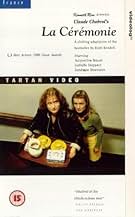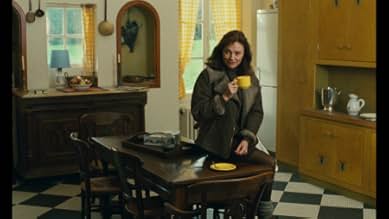PUNTUACIÓN EN IMDb
7,5/10
14 mil
TU PUNTUACIÓN
Una sirvienta recién contratada para una familia rica, se hace amiga de un empleado de la oficina de correos que la anima a rebelarse contra sus empleadores.Una sirvienta recién contratada para una familia rica, se hace amiga de un empleado de la oficina de correos que la anima a rebelarse contra sus empleadores.Una sirvienta recién contratada para una familia rica, se hace amiga de un empleado de la oficina de correos que la anima a rebelarse contra sus empleadores.
- Premios
- 9 premios y 11 nominaciones en total
Argumento
¿Sabías que...?
- CuriosidadesThe author Ruth Rendell has said that Claude Chabrol's version of her novel "A Judgement in Stone" is one of the few film adaptations of her work that she is happy with.
- Citas
Georges Lelievre: [referring, respectively, to Sophie the illiterate maid and Jeanne the nosy postal clerk] What a pair: one can't read at all, and the other reads our mail.
- ConexionesFeatured in Isabelle Huppert: Message personnel (2020)
- Banda sonoraCello Symphony
Composed by Benjamin Britten
Reseña destacada
In this character study of two hateful middle-aged women (not so middle-aged in the movie, however, as in the novel by Ruth Rendell) we are made to fathom the bad that may befall the good.
Claude Chabrol's direction is clean, crisp and uncluttered--which isn't always the case, witness his Madame Bovary (1991), which is a bit too leisurely and L'Enfer (1993) which muddles a whole lot. Maybe it's the editing. Anyway this is more like his quietly brilliant Une affaire de femmes (1988) with a fine script and striking performances by Sandrine Bonnaire and Isabelle Huppert, handsomely supported by Jacqueline Bisset, Jean Pierre Cassel and the very pretty Virginie Ledoyen.
Bonnaire plays Sophie, an intense taciturn woman harboring dark secrets, whom the Leliévres have hired to cook and keep house at their country home. Bisset is Catherine Leliévre and Cassel her husband. They exist in bourgeois heaven avec matrimonial bliss with two teenagers, a family so closely knit and so charmingly together that they watch a two-part production of Mozart's Don Giovanni on TV, just the four of them cosily on the couch.
Well, this sort of unobtainable happiness doesn't sit well with Jeanne (Huppert) who is a lowly postal clerk living alone whose past includes the (accidental?) killing of her four-year-old daughter. Jeanne takes a fancy to the Leliévre's strange new maid with the idea of showing her something besides work. They strike up a fateful friendship that we know is leading to something horrible.
Huppert is as good as I've seen her, which is very good indeed. She is particularly striking here in an uncharacteristic role as a spiteful, working class woman with a heart of vengeance against anybody better off than she is. There is just a touch of sly irony in her performance suggesting that she is having a particularly good time playing the nasty. Bonnaire's stark performance as the unbalanced and humorless, reclusive Sophie will remain etched in your brain. Apart they are like inert, harmless chemicals. Together they catalyze one another and become brazen and explosive.
The story, filled with little foreshadowing of the tragedy to come, gilds the lily of our tristesse by making the Leliévres so very, very nice. We are reminded of the violent hatred by the proletariat toward the privileged classes, in this case acted out by two loonies against an innocent, but representative family, echoing not only the Russian Revolution but even more so the French Revolution, now two hundred years old.
What I am trying to figure out why this is called La Cérémonie. Maybe it is a ceremony of execution.
(Note: Over 500 of my movie reviews are now available in my book "Cut to the Chaise Lounge or I Can't Believe I Swallowed the Remote!" Get it at Amazon!)
Claude Chabrol's direction is clean, crisp and uncluttered--which isn't always the case, witness his Madame Bovary (1991), which is a bit too leisurely and L'Enfer (1993) which muddles a whole lot. Maybe it's the editing. Anyway this is more like his quietly brilliant Une affaire de femmes (1988) with a fine script and striking performances by Sandrine Bonnaire and Isabelle Huppert, handsomely supported by Jacqueline Bisset, Jean Pierre Cassel and the very pretty Virginie Ledoyen.
Bonnaire plays Sophie, an intense taciturn woman harboring dark secrets, whom the Leliévres have hired to cook and keep house at their country home. Bisset is Catherine Leliévre and Cassel her husband. They exist in bourgeois heaven avec matrimonial bliss with two teenagers, a family so closely knit and so charmingly together that they watch a two-part production of Mozart's Don Giovanni on TV, just the four of them cosily on the couch.
Well, this sort of unobtainable happiness doesn't sit well with Jeanne (Huppert) who is a lowly postal clerk living alone whose past includes the (accidental?) killing of her four-year-old daughter. Jeanne takes a fancy to the Leliévre's strange new maid with the idea of showing her something besides work. They strike up a fateful friendship that we know is leading to something horrible.
Huppert is as good as I've seen her, which is very good indeed. She is particularly striking here in an uncharacteristic role as a spiteful, working class woman with a heart of vengeance against anybody better off than she is. There is just a touch of sly irony in her performance suggesting that she is having a particularly good time playing the nasty. Bonnaire's stark performance as the unbalanced and humorless, reclusive Sophie will remain etched in your brain. Apart they are like inert, harmless chemicals. Together they catalyze one another and become brazen and explosive.
The story, filled with little foreshadowing of the tragedy to come, gilds the lily of our tristesse by making the Leliévres so very, very nice. We are reminded of the violent hatred by the proletariat toward the privileged classes, in this case acted out by two loonies against an innocent, but representative family, echoing not only the Russian Revolution but even more so the French Revolution, now two hundred years old.
What I am trying to figure out why this is called La Cérémonie. Maybe it is a ceremony of execution.
(Note: Over 500 of my movie reviews are now available in my book "Cut to the Chaise Lounge or I Can't Believe I Swallowed the Remote!" Get it at Amazon!)
- DennisLittrell
- 30 ene 2002
- Enlace permanente
Selecciones populares
Inicia sesión para calificar y añadir a tu lista para recibir recomendaciones personalizadas
Detalles
- Fecha de lanzamiento
- Países de origen
- Sitio oficial
- Idioma
- Títulos en diferentes países
- La Cérémonie
- Localizaciones del rodaje
- Empresas productoras
- Ver más compañías en los créditos en IMDbPro
Taquilla
- Recaudación en Estados Unidos y Canadá
- 873.196 US$
- Recaudación en todo el mundo
- 873.196 US$
- Duración1 hora 51 minutos
- Color
- Mezcla de sonido
- Relación de aspecto
- 1.66 : 1
Contribuir a esta página
Sugerir un cambio o añadir el contenido que falta

Principal laguna de datos
By what name was La ceremonia (1995) officially released in India in Hindi?
Responde
![Ver Bande-annonce [OV]](https://m.media-amazon.com/images/M/MV5BNzliMDEwMzYtMjg1NS00Mjc1LTkwNDktMzc1MmJkNDJjZDIxXkEyXkFqcGdeQXRyYW5zY29kZS13b3JrZmxvdw@@._V1_QL75_UX500_CR0)
















